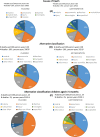Causes of death after biannual azithromycin treatment: A community-level randomized clinical trial
- PMID: 34559801
- PMCID: PMC8462712
- DOI: 10.1371/journal.pone.0250197
Causes of death after biannual azithromycin treatment: A community-level randomized clinical trial
Abstract
The MORDOR study, a masked, community-level randomized clinical trial conducted in Niger, Malawi and Tanzania (2015 to 2017), showed that biannual administration of single-dose azithromycin to preschool children reduced all-cause mortality. We sought to evaluate its impact on causes of death in children aged 1-59 months in Tanzania. A random sampling of 614 communities was conducted in Kilosa District, Tanzania, with simple random assignment of communities to receive either azithromycin or placebo. In these communities, a census was carried out every 6 months and children aged 1-59 months received biannual (every 6 months), single-dose azithromycin (~20mg/kg) or placebo depending on community assignment, over a 2-year period. Mortality was determined at the time of the biannual census. For child deaths, a verbal autopsy was performed to ascertain the cause using a standardized diagnostic classification. A total of 190- (0.58 /100 person-years) and 200 deaths (0.59/100 person-years) were reported in the azithromycin and placebo arms, respectively. Malaria, pneumonia and diarrhea, accounted for 71% and 68% of deaths in the respective arms. Overall, the mortality was not different by treatment arm, nor were the distribution of causes of death after adjusting for community clustering. The cause-specific mortality for diarrhea/pneumonia was no different over time. In children aged 1-5 months, 32 deaths occurred in the placebo arm and 25 deaths occurred in the azithromycin arm; 20 (62.5%) deaths in the placebo- and 10 (40%) in the azithromycin arm were attributed to diarrhea or pneumonia. Neither differences in the number of deaths nor the diarrhea/pneumonia attribution was statistically significant after adjusting for community clustering. In conclusion, azithromycin was not associated with a significant decline in deaths by specific causes compared to placebo. The non-significant lower rates of diarrhea or pneumonia in children <6 months who received azithromycin merit further investigation in high-mortality settings. Trial registration: NCT02048007.
Conflict of interest statement
The authors have no relevant conflicts of interest to disclose.
Figures



References
-
- UN. Progress towards the Sustainable Development Goals: Report of the Secretary-General. United Nations:; 2017 11 May 2017. Contract No.: E/2017/66.
-
- UN. Sustainable Development Goals: 3 Good Health and Well-being 2018 [cited 2018 November 2]. Available from: https://www.un.org/sustainabledevelopment/health/.

